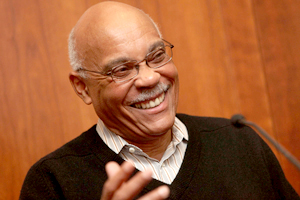Editors’ Note: March 9, 2016. An earlier version of this article in print did not include the correct photo of Peter Vaughan.
By Kenneth Iselhart III

Chair of the task force, Peter Vaughan Ph.D., hopes that the Diversity Task Force will help Fordham. (Fordham Ram Archives)
A task force established to assess race relations on campus is holding community
meetings open to the Fordham student body. The Diversity Task Force is to discuss its purpose, explain future plans to enact its goals and address student testimony on campus climate, according to a university-wide email inviting students to attend the meetings. Two meetings will be held at the Rose Hill campus and two will be held at the Lincoln Center campus.
Rev. Joseph M. McShane S.J., president of the university, called for the creation of the Diversity Task Force to study the climate of the university in response response to bias incidents committed on the campus earlier that fall.
Its purpose is to identify and gather information about existing efforts in the university to enhance and affirm a ‘catholic culture’ at Fordham and to develop recommendations for the president and the cabinet that will help them address the obstacles that impede our university’s ability to live up the Jesuit ideals, according to chair of the task force Peter Vaughan, Ph.D. and dean emeritus of the graduate school of social service.
One way the group plans to gauge the social climate of Fordham is by fielding questions and listening to the concerns of Fordham students at the community meetings.
“I hope that the community meetings will provide the forum for an honest dialogue and expression of opinion and the presentation of factual information and collection of that information by members to the Task Force,” Vaughan said.
TJ Strazzeri, GSB ’18, a student representative on the Task Force, shared a similar sentiment. “I hope to see great turn out so we can truly gauge where the community climate is,” Strazzeri said.
Students on the task force assist the group with research as well as providing an undergraduate’s perspective on campus life. In the email sent from the office of the president explained that the twenty-one students, faculty and administration of the Task Force were chosen “for their judgment, experience and ability to advocate for marginalized members of the university community.”
In addition to using student testimonial, the Diversity Task Force has been gathering information by using documents from committees within the university as well as reports and comments pertinent to studying the social climate at Fordham.
All the information gathered will be synthesized into a report with an expected completion date of June 30, 2016. It will contain recommendations for improving campus culture and making it more aligned with Jesuit ideals.
However, the Diversity Task Force is still in the earlier stages of its development.
“To date the task force has not made any recommendations to improve the current climate of diversity at Fordham, and it will be unable to make any until data are gathered,” said Vaughan.
According to Vaughan, the task force will not comment on the current race relations at Fordham as it is not yet in a position to discuss the climate at this time.
This is not the first time Fordham has used a task force to counter bias incidents. Fordham released a “University Report on Diversity and Anti-Bias Education” in response to bias incidents in Spring 2012.
Some of its general initiatives were to review university protocols regarding response to bias incidents and to create a way for students to confidentially report non-emergency bias incidents online. Other initiatives aimed at faculty, including workshops and training for administrators and staff, as well as greater availability of anti-bias materials at faculty orientation.
Many other colleges across the country have also implemented similar diversity task forces. Although there is no information available yet about what recommendations Fordham’s Task Force will make, reports from other schools give an idea as to what might be expected.
Other universities with diversity task forces are the State University of New York at Potsdam, Northern Illinois University, James Madison University and Duke University. The most common initiatives found in these reports were the revision of hiring processes to increase staff from underrepresented groups, and the training of current staff on issues of diversity. Some of the schools aimed to expand the curriculum to include diversity courses.
For now, the Diversity Task Force must gather information before it can make any recommendations, and the community meetings will play an important role in doing that.
“The Task Force wants and welcomes [the students’] participation in this process,” said Vaughan.
